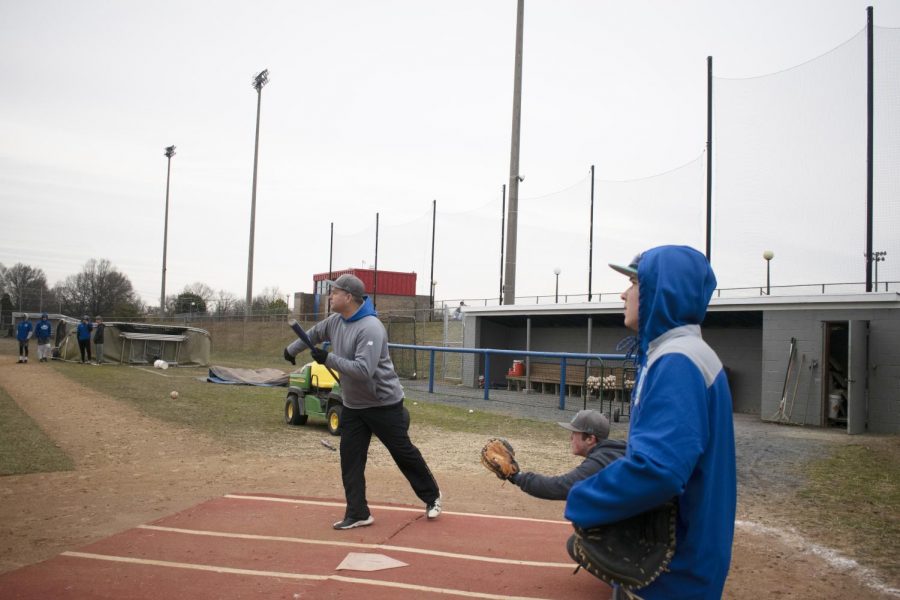Part-time coaches brings passion to job
Many of AACC’s part-time coaches have full-time jobs outside of the college. Pictured, Men’s Baseball head coach Chris Jenkins.
March 2, 2020
The “cherry on top” of his coaching career, says Women’s Basketball head coach Lionel Makell, was watching center Sarah Healy’s “face light up” when she learned the National Junior College Athletic Association had named her Player of the Week.
“I asked her if she’s ever imagined this,” he says. “She never thought she had that opportunity. Seeing her face light up … That’s what keeps me here. … I love my job because of moments like that.”
Makell, one of AACC’s 11 head coaches, isn’t the only one who has found a years-long passion in coaching community college athletics.
Some of those part-time coaches—and the 19 assistant coaches who help them—are retired and want to help the next generations of players. Others work full-time at other jobs and make time for practice and games.
Either way, Makell says, coaching requires a true passion for wanting to help young athletes.
“Twenty years ago, I would never have thought I would be [coaching],” says Men’s Baseball head coach Chris Jenkins. “But now, I’m thrilled to be involved. … I love every minute of it.”
Makell, a multi-sport athlete in high school and college, says team sports build lifelong values and relationships.
For Men’s Lacrosse head coach Joe Stanilaus, coaching seemed like “a no-brainer” after his playing career ended.
“I knew I wanted to coach, and I knew I liked the game,” Stanilaus says. “I love helping kids and helping students, so it seemed like a natural fit to me.”
Stanilaus has been around all parts of lacrosse, as a player, coach and spectator. For him, coaching comes with challenges, he says.
“You wake up, you go to your full-time job [and] then you go to your second full-time job,” Stanilaus explains.
He adds: “You put in some long days. … Being a husband; being a father; being a student … it’s all about being where your feet are.”
According to Stanilaus, his workday begins at around 6 a.m. and often ends after 8 p.m.
Men’s Soccer head coach Nick Cosentino says he has had similar experiences as he manages work and family life.
“Once you get married, and once you have kids, it’s hard,” Cosentino says. “The commitment can be a lot at times.”
AACC Athletics Director Duane Herr says the college’s coaches work day jobs ranging from high school teachers and administrators to real estate agents.
“I think our coaches deserve a lot of credit for the amount of work they put in,” Herr says. “They’re doing it for the love of the game and for the education and mentorship of the student athletes. We wouldn’t be anything without our coaches.”
Herr says the coaches teach more than athletic skills.
“They’re teaching the game, which is one small part of it,” he says. “I think the other part is that they’re really teaching life skills; they’re mentors.”
Men’s Basketball head coach Joe Snowden says he gets as much out of coaching as he puts into it.
“Helping players, it puts joy in your heart,” he says. “That’s really important to me. That’s what does it.”












